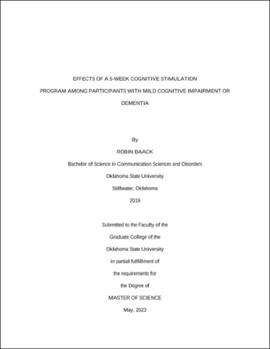| dc.contributor.advisor | Parveen, Sabiha | |
| dc.contributor.author | Baack, Robin | |
| dc.date.accessioned | 2023-08-25T20:06:02Z | |
| dc.date.available | 2023-08-25T20:06:02Z | |
| dc.date.issued | 2023-05 | |
| dc.identifier.uri | https://hdl.handle.net/11244/338917 | |
| dc.description.abstract | The aim of this thesis was to investigate the effects of a curated cognitive stimulation therapy (CST) program for participants with mild cognitive impairment (MCI) or different stages of dementia living in a local Midwest assisted living facility. With the growth of the geriatric population, more people are likely to develop either MCI or dementia later in life. Therefore, it is important that healthcare professionals including speech-language pathologists (SLPs) create and examine possible benefits of cognitive interventions to help delay and/or minimize effects of cognitive deficits among older adults. The CST program utilized in the study was based on existing literature about cognitive areas that are most relevant to address among older participants with MCI or dementia. | |
| dc.description.abstract | The CST program was five weeks in duration with sessions twice a week for a total of 10 sessions. Sessions were 45-60 minutes in duration. There were 10 participants total split into appropriate groups: three participants in a mild-moderate cognitive group, six in a moderate-severe cognitive group, and one as a control participant. The participants were assessed a week before and after the CST program using the same set of assessment measures. The Montreal Cognitive Assessment (MoCA) was used to determine the severity of cognitive deficits among the participants. In addition, the study included reading subtests of the Arizona Battery for Cognitive-Communication Disorders and a short version of the Boston Naming Test. The assessment battery also included the self-report Geriatric Depression Screener and the EuroQoL as the quality-of-life (QoL) screener. | |
| dc.description.abstract | Although there were no statistically significant differences between the two treatment groups, descriptive analyses showed that participants with mild-moderate and some with moderate-severe dementia demonstrated relatively improved cognitive scores at the end of the CST program. Some of the naming and reading assessments were not as sensitive in capturing participants’ actual level of functioning, as evident with ceiling effects. Overall, the results indicated CST could be a beneficial nonpharmaceutical treatment for people with MCI or mild to moderate dementia. Additional studies with larger sample sizes and with participants of different levels of functioning are warranted to understand the impact of CST programs better. | |
| dc.format | application/pdf | |
| dc.language | en_US | |
| dc.rights | Copyright is held by the author who has granted the Oklahoma State University Library the non-exclusive right to share this material in its institutional repository. Contact Digital Library Services at lib-dls@okstate.edu or 405-744-9161 for the permission policy on the use, reproduction or distribution of this material. | |
| dc.title | Effects of a 5-week cognitive stimulation program among participants with mild cognitive impairment or dementia | |
| dc.contributor.committeeMember | Freeman, Valerie | |
| dc.contributor.committeeMember | Norton, Sherri | |
| osu.filename | Baack_okstate_0664M_18145.pdf | |
| osu.accesstype | Open Access | |
| dc.type.genre | Thesis | |
| dc.type.material | Text | |
| dc.subject.keywords | cognitive stimulation therapy | |
| dc.subject.keywords | dementia | |
| dc.subject.keywords | mild cognitive impairment | |
| dc.subject.keywords | older adults | |
| thesis.degree.discipline | Communication Sciences and Disorders | |
| thesis.degree.grantor | Oklahoma State University | |
